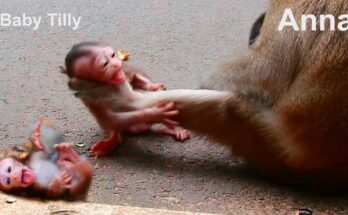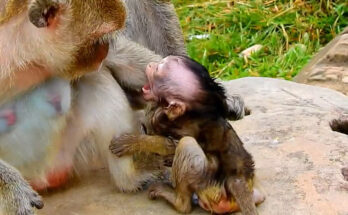
In the peaceful troop, a sudden conflict breaks out when a big baby monkey tries to steal milk from his mother. As the sun warms the jungle floor, the mother monkey sits calmly, nursing her tiny newborn. But her older child, now weaned and much larger, creeps close with greedy eyes. His hunger drives him to do the unthinkable—he sneaks in and attempts to latch onto his mother’s breast, pushing the newborn aside.
At first, the mother monkey tolerates the pressure, hoping the older one will stop. But he persists, clinging tightly and trying again and again to drink. The newborn squeals softly, losing its comfort and place. The mother, already exhausted from the demands of caring for two, turns her face sharply toward the big baby. Her warning grunts are ignored.
Then—snap!—the mother monkey bites. No mercy in her action. Her sharp teeth clamp down near his arm, a firm message of rejection. The big baby jumps back, crying out loudly in pain and shock, rolling on the ground with hurt pride. His plan has failed terribly, and worse, he is now wounded emotionally and physically.
The troop watches quietly. This is a lesson harshly delivered but necessary in the wild. A mother must protect her newborn’s right to milk and rest, even if it means hurting her older offspring. It is a heartbreaking but true reflection of survival instincts. The big baby, now whimpering alone under a bush, may learn that his time as a nursing infant has passed. His mother’s role must now focus on the new life depending entirely on her. It’s a jungle rule—firm and sometimes cruel.


